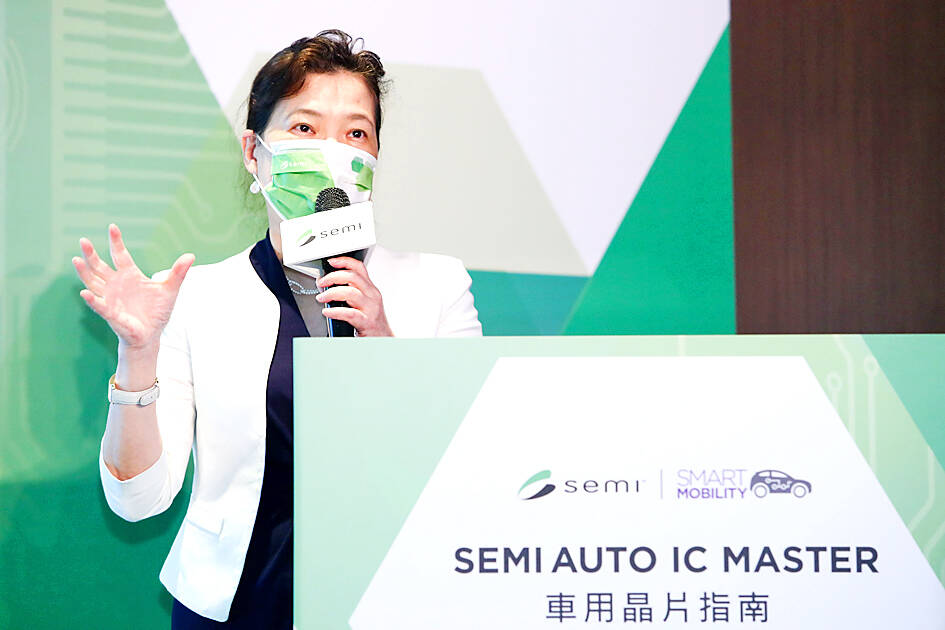Minister of Economic Affairs Wang Mei-hua (王美花) on Saturday returned from Japan, where she held talks on bilateral cooperation, including on semiconductors and electric vehicles (EVs), the Ministry of Economic Affairs said.
Wang arrived in Japan on Aug. 28 to witness the signing of a semiconductor supply chain partnership memorandum of understanding between the Taiwan-Japan Industrial Collaboration Promotion Office and Japan’s Kumamoto Prefecture.
The office and the prefecture would also collaborate on cross-field innovation development, the ministry said.

Photo: CNA
Japanese semiconductor production material and equipment suppliers have been keen to invest in Taiwan, it said, citing a plan by Sumco Corp, the second-largest silicon wafer maker in the world, and Formosa Plastics Group (台塑集團).
The two companies have agreed to invest NT$28.2 billion (US$921.93 million) on a 12-inch silicon wafer plant in Yunlin County’s Mailiao Township (麥寮). Production is scheduled to start in 2024.
Taiwan Semiconductor Manufacturing Co (TSMC, 台積電) and two Japanese firms also plan to build a fab, which is scheduled to start mass production in 2024, the ministry said.
The fab would manufacture specialty chips using TSMC’s mature 22-nanometer and 28-nanometer technologies.
Taiwan leads its peers in the development of high-end semiconductor technologies, and if Japan’s semiconductor production material and equipment suppliers continue to cooperate with Taiwan, the two countries could bolster their competitive edge in the global market, Wang said in a statement.
To boost bilateral ties, Wang visited the Japan Business Federation, a major business group, and several enterprises, including Sumco, Canon Inc, power supplier Jera Co, Mitsui Chemicals Inc, Panasonic Corp and IT solution provider NEC Corp.
Asked by the Japanese firms about a talent shortage in Taiwan, Wang promised to expand talent exchanges and training between Taiwan and Japan to ensure that the semiconductor supply chain is more resilient.
Taiwan excels in IC design, as well as electronics hardware and software development with respect to intellectual property rights, Wang said.
It can also respond promptly to sudden market changes, enabling the nation to produce critical components for EV use, she said.
Taiwan and Japan could aim for a larger share of the global smart EV market through cooperation in automotive electronics, smart cabins and 5G and the Internet of Vehicles connections, she added.
Wang is also eyeing business opportunities in carbon reduction amid the government’s goal to reach net zero emissions by 2050, the ministry said.
During her visit, she explored the use of hydrogen power to reduce thermal power generation and cut carbon emissions in Taiwan.
The promotion office was established by the ministry in March last year to accelerate the pace of industrial cooperation between Taipei and Tokyo.
Japan and Taiwan have since bolstered their cooperation in semiconductor development, the ministry said.

INVESTIGATION: The case is the latest instance of a DPP figure being implicated in an espionage network accused of allegedly leaking information to Chinese intelligence Democratic Progressive Party (DPP) member Ho Jen-chieh (何仁傑) was detained and held incommunicado yesterday on suspicion of spying for China during his tenure as assistant to then-minister of foreign affairs Joseph Wu (吳釗燮). The Taipei District Prosecutors’ Office said Ho was implicated during its investigation into alleged spying activities by former Presidential Office consultant Wu Shang-yu (吳尚雨). Prosecutors said there is reason to believe Ho breached the National Security Act (國家安全法) by leaking classified Ministry of Foreign Affairs information to Chinese intelligence. Following interrogation, prosecutors petitioned the Taipei District Court to detain Ho, citing concerns over potential collusion or tampering of evidence. The

Seventy percent of middle and elementary schools now conduct English classes entirely in English, the Ministry of Education said, as it encourages schools nationwide to adopt this practice Minister of Education (MOE) Cheng Ying-yao (鄭英耀) is scheduled to present a report on the government’s bilingual education policy to the Legislative Yuan’s Education and Culture Committee today. The report would outline strategies aimed at expanding access to education, reducing regional disparities and improving talent cultivation. Implementation of bilingual education policies has varied across local governments, occasionally drawing public criticism. For example, some schools have required teachers of non-English subjects to pass English proficiency

‘FORM OF PROTEST’: The German Institute Taipei said it was ‘shocked’ to see Nazi symbolism used in connection with political aims as it condemned the incident Sung Chien-liang (宋建樑), who led efforts to recall Democratic Progressive Party (DPP) Legislator Lee Kun-cheng (李坤城), was released on bail of NT$80,000 yesterday amid an outcry over a Nazi armband he wore to questioning the night before. Sung arrived at the New Taipei City District Prosecutors’ Office for questioning in a recall petition forgery case on Tuesday night wearing a red armband bearing a swastika, carrying a copy of Adolf Hitler’s Mein Kampf and giving a Nazi salute. Sung left the building at 1:15am without the armband and apparently covering the book with a coat. This is a serious international scandal and Chinese

TRADE: The premier pledged safeguards on ‘Made in Taiwan’ labeling, anti-dumping measures and stricter export controls to strengthen its position in trade talks Products labeled “made in Taiwan” must be genuinely made in Taiwan, Premier Cho Jung-tai (卓榮泰) said yesterday, vowing to enforce strict safeguards against “origin laundering” and initiate anti-dumping investigations to prevent China dumping its products in Taiwan. Cho made the remarks in a discussion session with representatives from industries in Kaohsiung. In response to the US government’s recent announcement of “reciprocal” tariffs on its trading partners, President William Lai (賴清德) and Cho last week began a series of consultations with industry leaders nationwide to gather feedback and address concerns. Taiwanese and US officials held a videoconference on Friday evening to discuss the